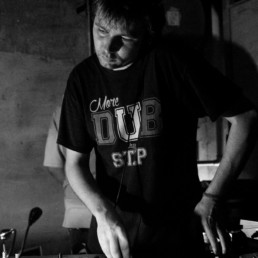“Be A Good Collector And Then You’ll Be A Good Selector”
The Groove Thief speaks with David “Ram Jam” Rodigan, MBE
David “Ram Jam” Rodigan hardly needs any introduction. A leading voice of reggae on the airwaves, he’s been behind the mixing desk for many an influential British radio station: Radio London, Capital 95.8, Kiss 100, BFBS Radio, BBC Radio 2, and currently BBC Radio 1Xtra. A revered sound clash champion, his crate is always full of legendary dubplates. He’s been sampled and name-checked by countless artists for good reason: if Rodigan plays your music, success will follow.
In this exclusive Q&A for NiceUp, The Groove Thief learns more about Rodigan’s writing debut, favourite musical era, views on remix culture, and mindset for a clash, as well as how to possibly follow in his enormous footsteps.
TGT: I greatly enjoyed your recent biography, My Life in Reggae, particularly how your own life was presented in context alongside the evolution of Jamaican music. How has the reception been for the book and tour?
DR: The reception for the book has been tremendous, so much so that the publishers have now gone with a paperback edition. The book tour Q&A sessions were great fun, enabling me to listen to people’s questions and tell some of my old anecdotes.
I think the reason that the book has been well received is because so many people can relate to the music via my story. Because for many people outside the West Indian communities, reggae was a music that they loved but didn’t necessarily get that close too… they had the albums but didn’t really attend the dances and clashes. I think the book brought the reader a little closer to the music.
TGT: As a Jamaican music-lover, you’ve arguably had some rather fortuitous timing! Which era(s) did you enjoy the most at the time, and which do you feel deserve more appreciation than they currently receive?
DR: Yes, it was fortuitous for sure as I lived through all the changes in the music right from its inception. I guess the rocksteady and early reggae period, 1966 to 1969, was very special for me because the music was allowed to breathe a little more after the dynamic energy of the ska era. The singers came into their own, and with them came such beautiful songs and melodies and cool rhythms.
TGT: You recently and enthusiastically, featured the world premiere of the Green Lion remix of Chronixx’s “Life Over Death” on your BBC1 radio show. What makes for a good remix in your opinion, and how do you view the role of the remix within reggae and bass music culture?
DR: Remix culture is now part of the music world in every aspect, apart from rock, and it especially enables producers and engineers to experiment with their unique skills and shine new light on the coals and original rhythms. I think it’s very exciting and is to be welcomed.
TGT: You’ve truly been a major influence on me, especially since I’ve recently gotten back into radio. What advice do you have for those of us that dream of following in your shoes?
DR: Love the music and the music loves you back; be a good collector and then you’ll be a good selector. Remember, as a radio DJ your duty is to present the very best aspects of the music and to always be mindful that your audience is counting on you to keep it fresh and interesting, always putting the music first, not your personal life.
TGT: You’re obviously no stranger to a clash – for someone who’s not familiar with that side of you, why do you enjoy this high-pressure aspect of sound system culture? While you are famed for some of your classic dubs, like Tenor Saw’s “Ring The Alarm,” do you find there are voicings by more contemporary artists that are equally deadly in the dance?
DR: Clashing keeps you on your toes, it requires tremendous commitment and energy. You have to plan well in advance, voice the best dubs in a unique way, write good clash lyrics, generate sketches and comic scenes so as to bring fun to the proceedings.
Don’t take yourself too seriously because nobody else will, it’s only music. And always remember what someone else thinks of you is none of your business, so be true to yourself and refuse to be intimidated by silliness. Be mature but have fun.
Voicing contemporary artists can be good too…but they have yet to become steeped in the historical elements of the music, simply because they are new, and therefore their dubs don’t always resonate as much as vintage dubs.
More info:
David Rodigan website
David Rodigan Facebook
The Groove Thief
.the future of dub is the present.
Reviews // Facebook // Soundcloud // Mixcloud
Featured in the South China Morning Post: “Tastemaker”
Featured in Boom Magazine: “Notes From The Underground“
Related posts
The Groove Thief talks to Soom T at Reggae Sun Ska
August 22, 2015
The Groove Thief Top Ten – December 2013
December 2, 2013
The Groove Thief Mix for NiceUp
January 14, 2016




